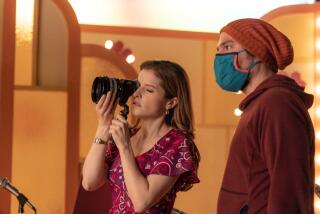‘Walking Tall’ is only as solid as the Rock
- Share via
The image of the Rock standing tall in the poster for “Walking Tall,” hefty piece of lumber delicately poised to decimate the ungodly, is powerful and persuasive. Too bad you can’t say quite the same for the film.
Not that this remade, even more fictionalized version of the exploits of real life Sheriff Buford Pusser is wholly without merit. For one thing, the Rock is as commanding an action star as the current scene offers. And the story of a man who takes the law -- not to mention that sizable chunk of timber -- into his own hands when his home town turns into a sinkhole of iniquity is still as potent as it was in the 1970s and ‘80s, when it inspired not just the original film but two sequels, a TV movie and a short-lived network series.
The 1973 “Walking Tall” was hardly a masterpiece, but all those follow-ups testify to its legendary visceral impact. There’s no reason why the 2004 version couldn’t replicate that, but a number of factors converged to work against it happening.
First came a series of changes to the original story, starting with altering the hero’s iconic name to the ordinary Chris Vaughn and moving the locale from a realistic Tennessee to a generic Pacific Northwest, that feel like misguided attempts to “improve” on the original.
So while the 1973 villains were a creepy, faceless cartel, the new “Walking Tall” has a standard designated bad guy named Jay Hamilton (Neal McDonough) who, how convenient, was an old high school rival of Vaughn’s. And while Buford Pusser had a loyal wife, Vaughn has the kind of exotic dancer girlfriend (Ashley Scott) who can look fetching playing action scenes in bright red underwear. The film’s director, Kevin Bray, even wanted to change the sheriff’s trademark stick to an aluminum baseball bat (“more 21st century”) before wiser heads prevailed.
The real divergence between the two “Talls,” however, is that that though they seem similar they actually come out of completely different filmmaking traditions.
The original “Walking Tall” was one of the last gasps of the venerable B picture tradition, and its director, Phil Karlson, had a lifetime’s experience doing films with names like “Scandal Sheet,” “99 River Street,” “5 Against the House” and the cult classic “The Phenix City Story.” These films didn’t cost a lot of money, but their creators often believed that was no reason they couldn’t be made with craft, integrity and individuality.
Director Bray’s “Walking Tall,” by contrast, comes out of the more modern tradition of major studio factory productions, and bargain basement ones at that. The film has five producers, two executive producers and four writers, not counting the late Mort Briskin, whose 1973 script gets a “based on” credit.
Almost everything about this film, from a group of costars whose most prominent member is Johnny Knoxville to a Pacific Northwest setting that allowed for filming in less expensive Canada, screams it was made for a price.
It doesn’t help that director Bray, like so many of his cohorts, is making only his second feature after extensive work in commercials and music videos. His background has not given him any particular gift for character development, and once the lead starts to fly it’s clear he’s never met a bullet he didn’t like.
On the other hand, this “Walking Tall” does have the Rock, and that, both physically and metaphorically, is no small thing. When he is glowering and fighting and in general putting people between himself and a hard place, it is hard not to be diverted, not to feel that even legitimate objections can momentarily be set aside.
The Rock’s Chris Vaughn is a Special Forces veteran who just wants to come home and work at the local lumber plant. The plant, however, has been replaced as the town’s main source of income by the Wild Cherry, a glitzy, state-of-the-art casino fully equipped with the latest in surgically enhanced dancers.
Incensed when he discovers the house cheating at dice, Vaughn starts a brawl that leads to his being overpowered by a gang of miscreants and so carved up that, the doctor reports, in a line nicely lifted from the original, “a lesser man wouldn’t have survived.” He runs for sheriff once he’s on his feet and, aided by Knoxville’s unorthodox deputy, he sets about cleaning up the town.
Though the Rock’s combination of physicality and charisma is always welcome, the fact that he is so much a man among boys here, considerably more formidable than the film’s standard issue bad guys, makes the jeopardy he is supposed to be in not as convincing as it ought to be. “Walking Tall” is never going to be “King Lear,” but we’ve already seen it be better than this.
*
‘Walking Tall’
MPAA rating: PG-13, for sequences of intense violence, sexual content, drug material and language
Times guidelines: Considerable violence
The Rock ...Chris Vaughn
Johnny Knoxville ... Ray Templeton
Neal McDonough ... Jay Hamilton
Kristen Wilson ... Michelle Vaughn
Ashley Scott ... Deni
A Hyde Park Entertainment/Mandeville Films production in association with Burke/Samples/Foster Productions and WWE Films, released by Metro-Goldwyn-Mayer. Director Kevin Bray. Producers Jim Burke, Lucas Foster, Paul Schiff, Ashok Amritraj, David Hoberman. Executive producers Keith Samples, Vince McMahon. Screenplay David Klass and Channing Gibson and David Levien & Brian Koppelman, based on a screenplay by Mort Briskin. Cinematographer Glen MacPherson. Editors George Bowers, Robert Ivison. Costumes Gersha Phillips. Music Graeme Revell. Production design Brent Thomas. Art director Roxanne Methot. Set decorator Louise Roper. Running time: 1 hour, 26 minutes.
In general release.
More to Read
Only good movies
Get the Indie Focus newsletter, Mark Olsen's weekly guide to the world of cinema.
You may occasionally receive promotional content from the Los Angeles Times.











